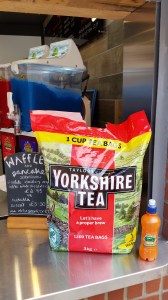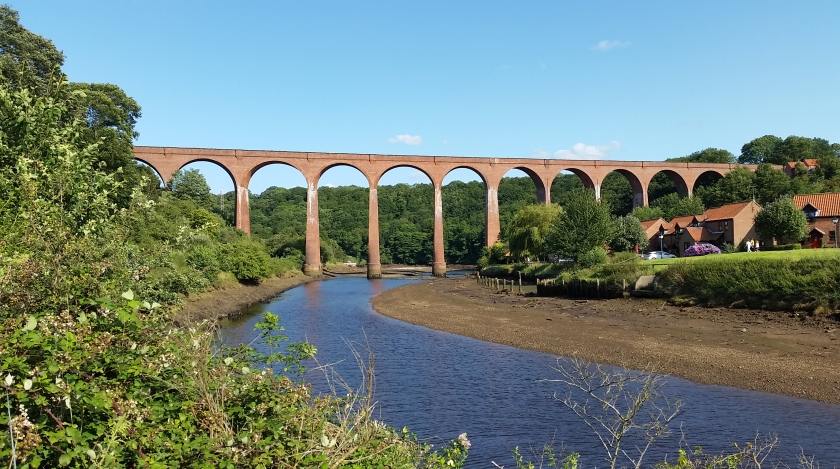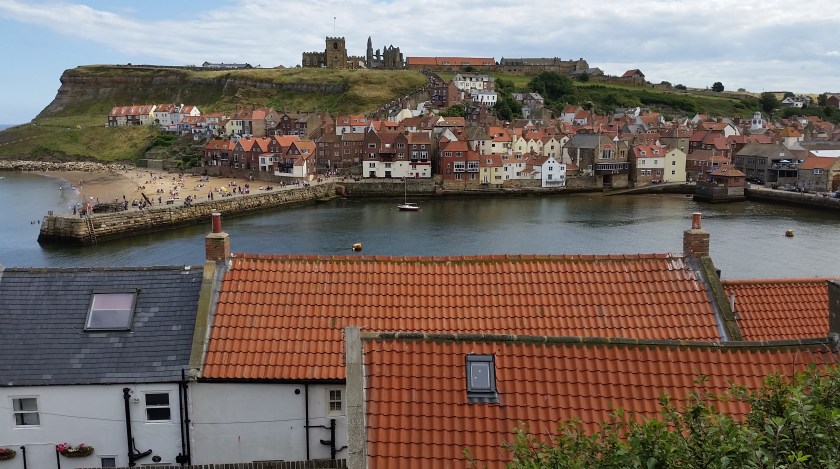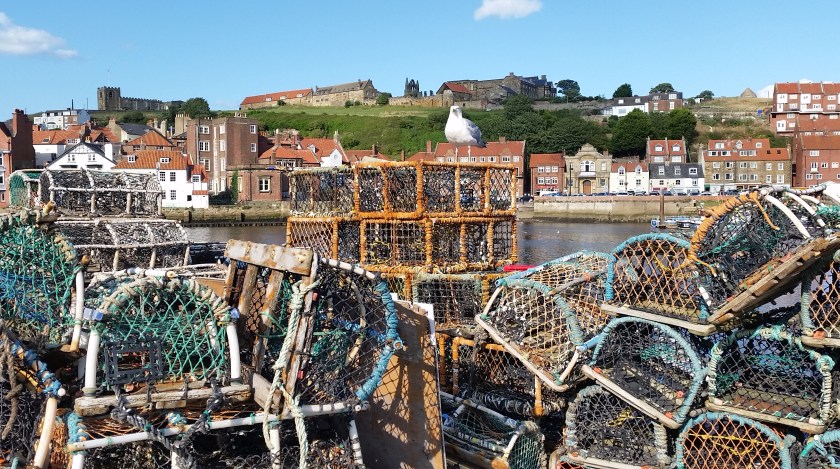
You notice the gulls first, careening through the air.
Seabirds arcing on updrafts. Their constant, shrill commentary carrying on the wind. The sheer size of them. So much larger than any other gulls I’ve seen. Our brochures warn of their ‘dangerous’ 3 inch beaks, and caution tourists not to feed them. I don’t feel threatened. Until I squint at the sky above me, and think of Hitchcock.
I have other thoughts, about dodging all that guano falling from such great height. Maybe I should be wearing a hat.
Whitby, North Yorkshire. Seaside town, fishing port. Raided by Vikings. Visited by smugglers and press gangs. Famous for its Fish and Chips.
We’re staying in Ruswarp – a one pub, one church village – in the elegant Ruswarp Hall, just outside the sprawl of Whitby town and harbour. Our Jacobean lodgings, built in 1603, are said to have a resident ghost. Hopefully not the chain-dragging, wailing type, who frequents the wee-small-hours. I’d like to get some sleep this week.
It’s six miles into Whitby if you drive, following the roads into the port. Or there’s a narrow stony track beside the train line, overhung with nettles and brambles, passing by fields, and crossing open pasture. The sign indicates it’s a one mile walk. A better option. We set off on foot from the beautiful old station building.
Turquoise sky and afternoon sunshine warm our backs. And all the while, the wheeling birds. Their excited calling overhead.
‘More, more!’ they promise, as we pick our way over the loose gravel and stones, their voices guiding and encouraging, their airborne bodies privy to the view that as yet, we cannot see.
A steam train huffs past, inches from our passage, all puff and bluster and churning air; from another time, when life moved more slowly, and there was more silence in which to think and dream. It somehow befits the pace of our footfall into town, and our choice to walk instead of drive. This path must once have been the way to church on Sunday, the way to Whitby for provisions, the ladies lifting their skirts carefully, baskets over one arm. I’m glad to be walking, enjoying the anticipation of rounding the final curve in the track, and having that first sight of the town.
I let myself feel the timelessness here, the history underfoot. Back to an era when Ruswarp Hall had been a larger estate, when the houses that now line the street opposite the entrance were set aside as stables. I imagine the ripe smell of dung and oiled leather, the metal clink of a shaken harness, the dull thump of a hoof inside. And always, the birds, bringing the sea inland.
‘Come! Come now!’ they urge from above.
We’re passing under the high red brick bridge, the old railway viaduct, its 13 arches towering above and beyond us. Impossibly wide. The River Esk is on our right now, tidal, the water out, birds picking through the exposed muddy banks; our path curving left and then right. The ever increasing excitement of the gulls. A greater number joining the chorus, to chide and hurry us.

‘See, see, see!’ they trill, in a sound that resonates from my childhood. Seaside holidays, English summers. Buckets and spades, and sandy fingers. Cold seas, and goosefleshed skin.
Then we do see. The first views of the harbour. A mosaic of colourful boats cramming the water, the red tiled rooftops of houses shouldered together on steep cliffs. And at the skyline, the ruins of The Abbey like a broken jaw, yawning at the open sea below. The town’s oldest and most recognisable landmark.

Surely the best mile I’ve ever walked. The most perfect backdrop. Heather covered moors on one side, and open ocean on the other. We’re looking right at the North Sea now. This is the ‘Dinosaur Coast’ – and 35 miles of fossil heaven.
Over the harbour walls, children cluster with hovering parents, long strings dropped into the water far below, crab buckets at their feet. A symbiosis, of sorts. For the children, the excitement of the catch. For the molluscs, a free meal, in exchange for a short period of discomfort.
The long-suffering crabs trade their cool muddy homes to share an overcrowded plastic bucket for the day, filled with sun-warmed water. Then follows the indignity of brief flight – being flung back down to their watery homes at sundown for a repeat performance in the morning. New strings, new children. Every day they take the bait. Perhaps they never learn. Perhaps it’s an easier existence than foraging the dark depths for an unknown menu.
Our guiding birds take off for the open sea, to whirl and crest the updrafts. It must be an amazing feeling, to be so free and unhurried.
Over the next few days we walk the cobbled streets, descending steep inclines into fishing villages, and narrow alleyways between twee cottages perched on cliffsides.
Dinosaur footprints are visible on the beach in Whitby. Fossils abound between the coastal fishing village of Staithes in the north, to Robin Hood’s Bay further south. The shops are brimming with them. Coiled shells of ammonites, preserved from the Jurassic era. Fern and leaf prints. There’s even a dolphin sized Ichthyosaur on display at the museum: 180 million years old, and the length of a small car. It makes me feel small, and insignificant, and very, very young.
Displays of black stoned jewellery fill the local shops, but jet is just another trick of time. It might look and feel like stone, but it’s actually the fossilised wood of the araucaria tree.
Not all the history here is measured in millenniums. Some of it only goes back a few centuries.
Two hundred years ago Whitby was a place that resonated with the chiselling and hammering of shipbuilding. Whaling vessels, and coal transporting colliers were built in Fishburn’s Shipyard. All four ships used by Captain James Cook in his voyages around the globe were built in Whitby. In fact the young James Cook began his working life as a shop assistant in the grocery store at Staithes. Perhaps the sight of the ocean every day stirred his imagination, and fueled his desire to explore the open seas?
When Bram Stoker visited in 1890, his imagination was stirred in a different way. The sight of the Gothic Abbey and its angular ruins on the skyline inspired his next novel. Thanks to him, we all have Dracula, and vampires, and the acquired dread of open windows after dusk. I was a child who grew up with Vincent Price’s chilling laugh, and a regular diet of Hammer House of Horror on a Saturday night. So try telling me I won’t wake with Christopher Lee in a cape at the end of my bed if I keep the casement open.
I have memories of an entire childhood spent sweltering behind closed bedroom windows in the summer. It didn’t help that we had bat-filled woodlands at the back of our house. Or that the occasional one blundered into the window-frame with a thud in the dead of night. So much for bats having excellent echolocation in the dark. I didn’t go so far as hanging garlic over my pillow, but I always kept the sheet well up, over my head, protecting my bare neck from those canine fangs.
Whitby reminds me of the English seaside towns of my childhood. The unfurling pier, and slapping sea breezes. Long eared donkeys on the sand, saddled up and ready to ride. Fudge shops, and sticks of candy rock – more flavours than Harry Potter could ever choose. The windows of jewellery stores filled with jet, its glistening black the colour of crows’ eyes. Favoured by the eternally mourning Queen Victoria after Albert’s death.

We walk meandering coastal paths, cobbled streets, and the breath stealing 199 steps up to the Abbey. We listen to the strident calls of circling seabirds, and manage to avoid becoming target practice for any of the gulls.
Our first night in Ruswarp Hall, we had tractors roaring up and down the steep road outside until 11pm. Try and sleep through that if you can. Some sort of harvest deadline. Urgent farming. Who’d have thought? After that I sleep soundly.
But I never see the ghost. Or hear any clanging of chains. I don’t see a single bat either, or any vampires. Shame really. I could’ve added chiroptophobia and sanguivoriphobia to my existing fear of open windows.
Paradoxically, on the one night I’d planned to have fish and chips, the Ruswarp pub had run out of fish. In a fishing town. You couldn’t make this stuff up.
Such a missed opportunity, and perhaps one of the many reasons I’ll have to go back.

**




I like the many pictures you summon. It is very vivid. Another walk through the English countryside or coast? Soon?
LikeLike
Thanks Armand. We had a lovely week.
LikeLike
At last I’ve read it and I’m back in Whitby again, enjoying another lovely visit. Super photos too. I especially like the lobster pots.
Kath xx
LikeLike